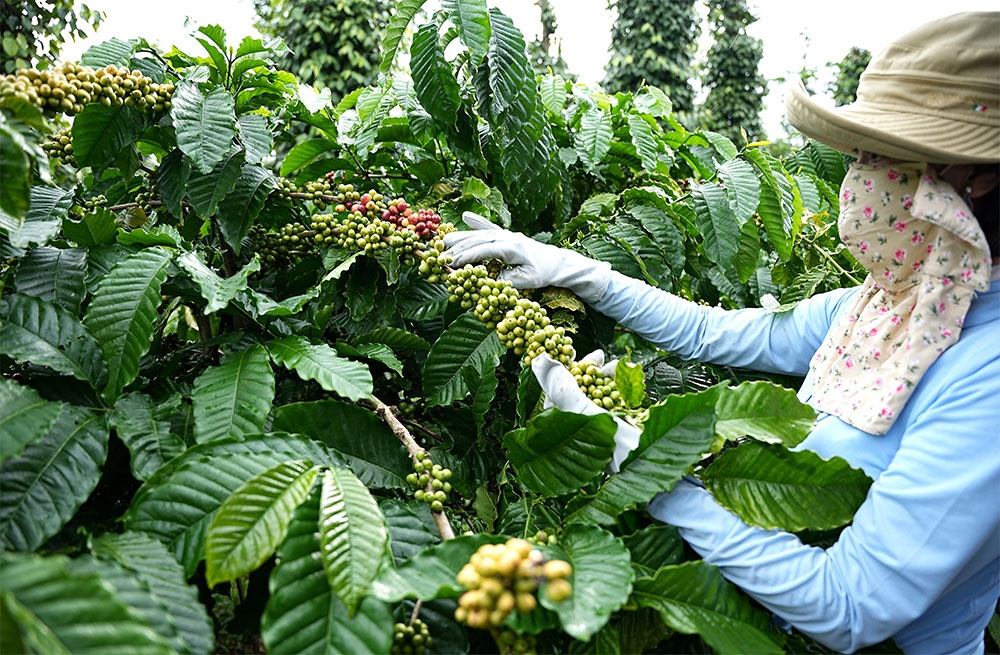Nestlé supports farmers to advance regenerative agriculture
Global food corporation Nestlé not only produces high-quality and nutritious products for consumers but also contributes to accelerating the shift to regenerative food systems through collaboration and companionship with farmers and partners.
 |
| Nestlé supports farmers to advance regenerative agriculture |
More than 700 specialists and more than 5,500 staff at Nestlé are supporting the transition to regenerative food systems, and Nestlé is also partnering with 500,000 farmers globally to implement regenerative agriculture initiatives.
In Vietnam, via the NESCAFÉ Plan initiative deployed since 2011, Nestlé’s agronomists have supported 21,000 farmer households to adopt sustainable coffee farming practices in Central Highlands provinces.
“Advancing regenerative agriculture models is one of our important efforts towards the goal of net-zero emissions by 2050. We aim to improve soil health, soil quality, and soil fertility, as well as protecting water resources and biodiversity,” said Khuat Quang Hung, director of Corporate Affairs at Nestlé Vietnam.
“Healthier soils are also more resilient to the impacts of climate change and can increase the productivity of crops, helping improve livelihoods and enhancing food security, along with capturing increased levels of carbon from the atmosphere,” Hung added.
Accompanying farmers
Having participated in the NESCAFÉ Plan since 2015, Mai Thi Nhung in Cu Kuin district of Dak Lak province has been trained in sustainable farming techniques, such as efficient intercrops and water-saving irrigation, and supported with high-yield, disease resistant coffee plantlets to rejuvenate the aged coffee farm, thereby improving productivity and the quality of coffee beans.
Among them, Nestlé’s agronomists have shared initiatives and techniques that are easy to apply, such as composting coffee husks to produce microbial fertilisers and measuring soil moisture with empty water bottles. With that, they have helped Nhung reduce the amount of chemical fertiliser by 20-30 per cent and save 40-60 per cent of the water used for irrigation. Nhung also combines weeding manually with mechanical weeding methods without using herbicides or other plant protection chemicals. This helps recover soil health, increases the proportion of microorganisms in the soil, and makes the soil more porous.
Thanks to the proper intercropping techniques of coffee plants with other trees, the coffee yield of her family gardens reached 3.5 tonnes per hectare in 2022, higher than the previous 2.5 tonnes. Meanwhile, pepper and durian yields reached 2.5 tonnes per hectare and 1.5 tonnes per hectare respectively, contributing to improving family income.
As of 2022, Nestlé has helped 21,000 farmers access and adopt regenerative agriculture farming practices, offering 330,000 training sessions. Most farmers have used microbial fertilisers on their plants (out of the total number of gardens surveyed), and over 85 per cent of coffee gardens have diversified crops, with an average of three different varieties. Thanks to this, farmers’ incomes have improved by at least 30 per cent and, in some cases, as much as 100 per cent compared to theirs before joining the NESCAFÉ Plan.
In particular, the programme also supports farmers in applying digital transformation to farming management as well as sustainable farming practices. With digital technology applications such as the Digital Farmer Field Book, farmers can effectively manage inputs such as water and fertiliser, contributing to the reduction of carbon emissions for each kilogramme of harvested coffee.
Meanwhile, since June 2023, Nestlé has incorporated a project on sustainable coffee farming under the agro-forestry model into the NESCAFÉ Plan. The project aims to plant more than 2.3 million trees between 2023 and 2027 to bring economic value, create additional income for farmers, improve coffee farm conditions, adapt to climate change and natural disasters, and improve soil quality and biodiversity. The project is expected to absorb and store about 480,000 tonnes of carbon dioxide.
The NESCAFÉ Plan, which is being applied in Vietnam and globally, is one of many programmes that contribute to Nestlé’s commitment to halve GHG emissions by 2030 and reach net-zero GHG emissions by 2050. In addition, the plan aims to achieve 100 per cent responsibly sourced coffee by 2025; and 50 per cent of coffee sourced from regenerative agricultural methods by 2030.
 | Nestlé Vietnam recognised for positive work culture Le Thanh Khang, head of Organization Department & Talent Management of Nestlé Vietnam, told VIR's Thai An about efforts to ensure welfare and encourage employees to promote value in the working environment, contributing to helping Nestle be honoured four times as a top Typical Enterprise for Labour. |
 | Nestlé Vietnam values partnerships for sustainability goals The circular economy and sustainable development are long roads that one cannot travel alone. Everyone must go together, including manufacturers, distributors, managers, and consumers. |
What the stars mean:
★ Poor ★ ★ Promising ★★★ Good ★★★★ Very good ★★★★★ Exceptional
Related Contents
Latest News
More News
- The generics industry: unlocking new growth drivers (February 04, 2026 | 17:39)
- Vietnam ready to increase purchases of US goods (February 04, 2026 | 15:55)
- Steel industry faces challenges in 2026 (February 03, 2026 | 17:20)
- State corporations poised to drive 2026 growth (February 03, 2026 | 13:58)
- Why high-tech talent will define Vietnam’s growth (February 02, 2026 | 10:47)
- FMCG resilience amid varying storms (February 02, 2026 | 10:00)
- Customs reforms strengthen business confidence, support trade growth (February 01, 2026 | 08:20)
- Vietnam and US to launch sixth trade negotiation round (January 30, 2026 | 15:19)
- Digital publishing emerges as key growth driver in Vietnam (January 30, 2026 | 10:59)
- EVN signs key contract for Tri An hydropower expansion (January 30, 2026 | 10:57)

 Tag:
Tag:



















 Mobile Version
Mobile Version